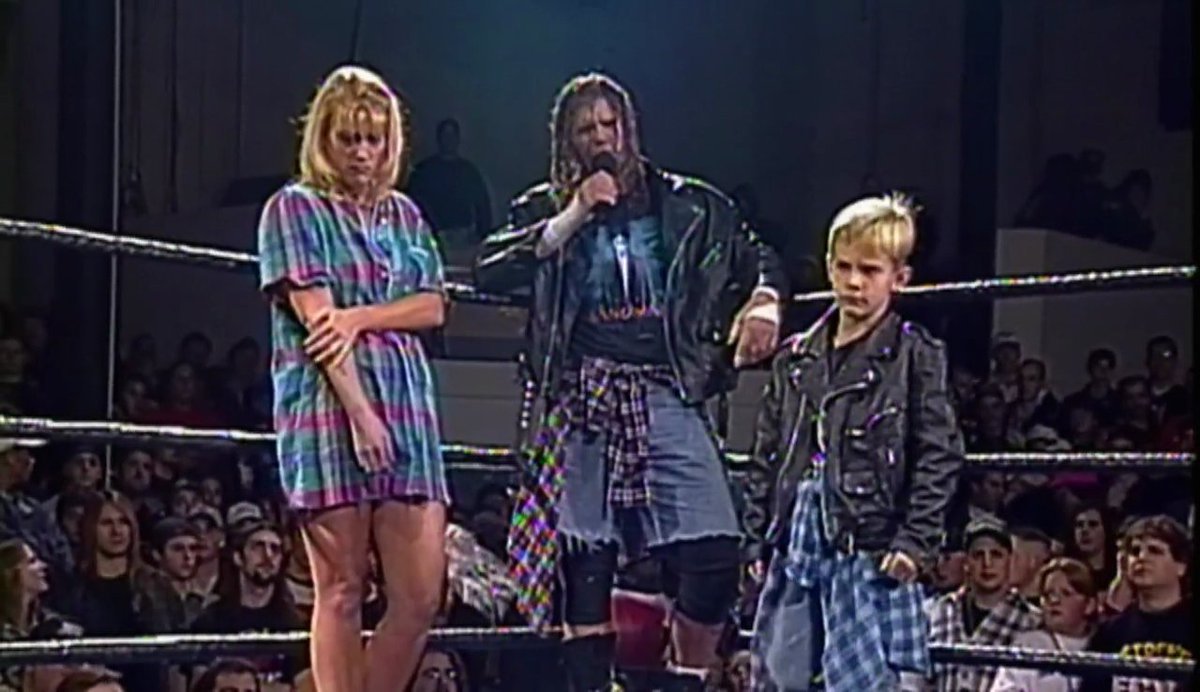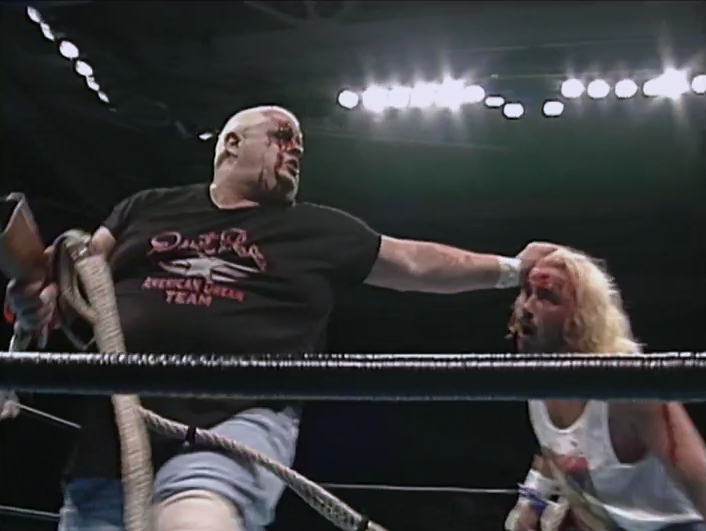Paul Heyman's Partnership With Eddie Gilbert
Paul Heyman has extended his vast creativity, knowledge and experience to countless professional wrestlers, but he, too, once sat under the learning tree. From Dusty Rhodes to managers such as Lou Albano, the Grand Wizard of Wrestling and Freddie Blassie, Paul would gain an incredible perspective on the business. One name often overlooked is Eddie Gilbert's.
The two first crossed paths in WWF while Paul Heyman was working as a photographer and Eddie Gilbert was utilized as an enhancement talent. At the time, Eddie was Bob Backlund’s protege and cared for him. This stemmed from Bob’s previous relationship with Tommy Gilbert, Eddie and Doug’s father.
Note: It wasn’t uncommon for Vince McMahon Sr to provide opportunities to enhancement talent that would wind up becoming big stars years later
Following Paul’s national stint with Verne Gagne’s AWA, Paul began to work for a new promotion in Marietta, Georgia, started by Jerry Blackwell and Tommy Rich, which was understandably a big culture shock to Paul.
Paul also became involved with Windy City Wrestling out of Chicago. Due to some notoriety in the area based on his AWA stint as Paul E. Dangerously, there was interest in being brought in as a talent, but Paul only agreed if he was made booker. To further support his request, Paul wrote out the following four television shows, leveraging the current roster to execute his plans. The promotion owner was so impressed that he officially appointed Paul as the booker.
While working in Marietta, Georgia, Eddie was booked in the territory with his brother Doug and then-wife Missy Hyatt. Eddie explained to Paul that he was taking over Continental Wrestling in Montgomery, Alabama and asked Heyman to be his assistant booker. In return, Eddie would act as Paul’s assistant booker for Windy City Wrestling.
As you can imagine, it was an interesting concept while serving as a two-person booking team, with Eddie taking the lead in Alabama and Paul taking the lead in Chicago.
During an appearance on The Steve Austin Show Podcast, Paul would explain how each of them would book.
“Oh, Eddie was a heel booker. Eddie was a really smart heel booker. The difference in philosophies really balanced us out together really well. It’s funny because I felt the same chemistry with CM Punk many years later that Eddie and I had together. But again, that was another role reversal because clearly, Eddie was a mentor and I was Eddie’s protege.
The difference is our philosophies was Eddie was always influenced by and wanted to re-create angles that he saw in Memphis many, many years earlier. So, this is what Jerry Lawler did in 77 with Jackie Fargo. This is what Bill Dundee did with Buddy Landel. Or, this is what Sputnik Monroe did with my dad. And he would want to put a different spin or twist on it, but essentially, he just wanted to do the things that he had seen growing up.
I always felt tasked to do something new and different and never before done. First time ever. A different approach. A new twist on things. So, that was the only conflict that we really had and that Eddie wanted to rehash, but update and I wanted to start from a blank piece of paper and make things up from the get go.”
Paul would also note that the two “argued their asses off” but it was so productive and learning for the two since ideas were frequently enhanced with suggestions. This led to a transfer of knowledge with Paul learning from Eddie’s concepts while Eddie would also absorb a new line of thinking in return.
Paul considered this collaboration to be an exhilarating one while experiencing a sense of pride to see these ideas play out.
An inquisitive Steve Austin would ask Paul Heyman about the supposed brilliance of Eddie Gilbert, which was frequently referenced by many who encountered him and specifically wanted to know if much of what he learned came from Jerry Lawler and Jerry Jarrett:
“Yes. I think Eddie was third generation. I think Eddie’s either grandmother or grandfather was in the business. Obviously, his father was a long-time veteran in the Tennessee area and then became a respected referee for Bill Watts. So, Eddie grew up in the business. He grew up as a little boy seeing Jackie Fargo and Jerry Lawler. Obviously, he was the world’s biggest Jerry Lawler fan. To the point of obsession. at times, where I thought it was unhealthy for Eddie and that he truly wanted to be Jerry Lawler.
Eddie married his first wife, the wife before Missy, because she looked like Jerry Lawler’s wife. That was just Eddie’s obsession with Jerry Lawler.
Was Eddie brilliant? Absolutely. Absolutely a brilliant mind driven by a second to none passion for the business. A great finish man. An understanding of heat on the heels and when to blow it off. Eddie’s timing was in a storyline and putting storylines together and when they would arc and when they would peak and how they could be used to draw money was brilliant. The best in his day. I don’t think Eddie was original, which I think overtime would bite him in the ass. Although, one of the greatest angles of the 1980s and I’ll say this to this day, one of the most heated angles I’ve ever seen was when Eddie was the booker, was when in UWF, The Russians put the flag over Bill Watts.”
That was as heated and as emotional and as money drawing of an angle that I ever saw in the 1980s. And we’re talking the Hulkamania Era, that was Eddie Gilbert. That was Eddie at his absolute best.”
Following Paul’s departure from WCW, he would reunite with Eddie once again in Eastern Championship Wrestling where Gilbert served as head booker. Paul acted as an on-screen manager while also once again serving as the assistant booker, which was a partnership the two were already familiar with.
Unfortunately, the two started to frequently disagree with each other and Tod Gordon was particularly sold on Paul’s vision for the future of ECW.
According to ECW website designer Brett Schwan in the book The Hardcore History: The Extremely Unauthorized Story of the ECW:
“Eddie wanted control and Paul wanted to go in a different direction. Eddie wanted ECW to be more of a Memphis-style promotion, and Paul wanted to go the more extreme direction.”
Eddie would suddenly resign from the company as Heyman kept the ball rolling.
Regarding his departure, Eddie Gilbert would share the following in a letter to the Wrestling Observer Newsletter in October of 1993:
“I did in fact resign from ECW when I got the information that we would be working together with Jim Crockett. The date of my resignation was September 7, the same day I got the news about the so-called merger. I really felt it wasn’t in our best interest at ECW to give away any momentum we had started to someone else who didn’t have anything to offer us in return. The actions that transpired after that date, especially on the 9/18 card, cost me the closest friendship I’ve ever maintained in this business. I gave the speech ‘that no one knew about’ because I was worried about how my departure would be handled. I really just wanted to leave with my head held high.”
According to Shane Douglas, Paul almost immediately elevated the talent.
“Eddie had been doing something that was pretty good in ECW, but he was using a lot of cheap locals, and they weren’t going to be taking us to the next level. Paul was instrumental in bringing in talent that blew away what any other independent group had to offer.”
Sadly, Eddie was found dead in a Puerto Rico hotel room on February 18, 1995. An apparent heart attack at 33 years old.
Paul would note that while Eddie was extremely creative, he was often limited by the boundaries of his own imagination, which is why he’s not necessarily remembered as the great booker he showed glimpses of:
“I think Eddie, overcompensating for a great deal of insecurity because he was an insecure person, I think Eddie relied on the boundaries of his own imagination that was self-imposed by looking for these Jerry Lawler and Jackie Fargo and Bill Dundee and Jerry Jarrett angles. Instead of allowing his own creativity to take over and to do things that had never been done before, never thought of before that would have made it to this day described as an ‘Eddie Gilbert Angle.’
Because really, what is an Eddie Gilbert Angle? There’s no brand of what Eddie brought to the table and a shame because I learned so much from him and he offered so much to the business. He just never offered his own branding of it.”
Many ideas grow better when transplanted into another mind than the one where they sprang up. You must often surround yourself with people who will push you to do and be better. The same applies to the world of professional wrestling.
Photo Credit: Georgetahinos.smugmug.com



